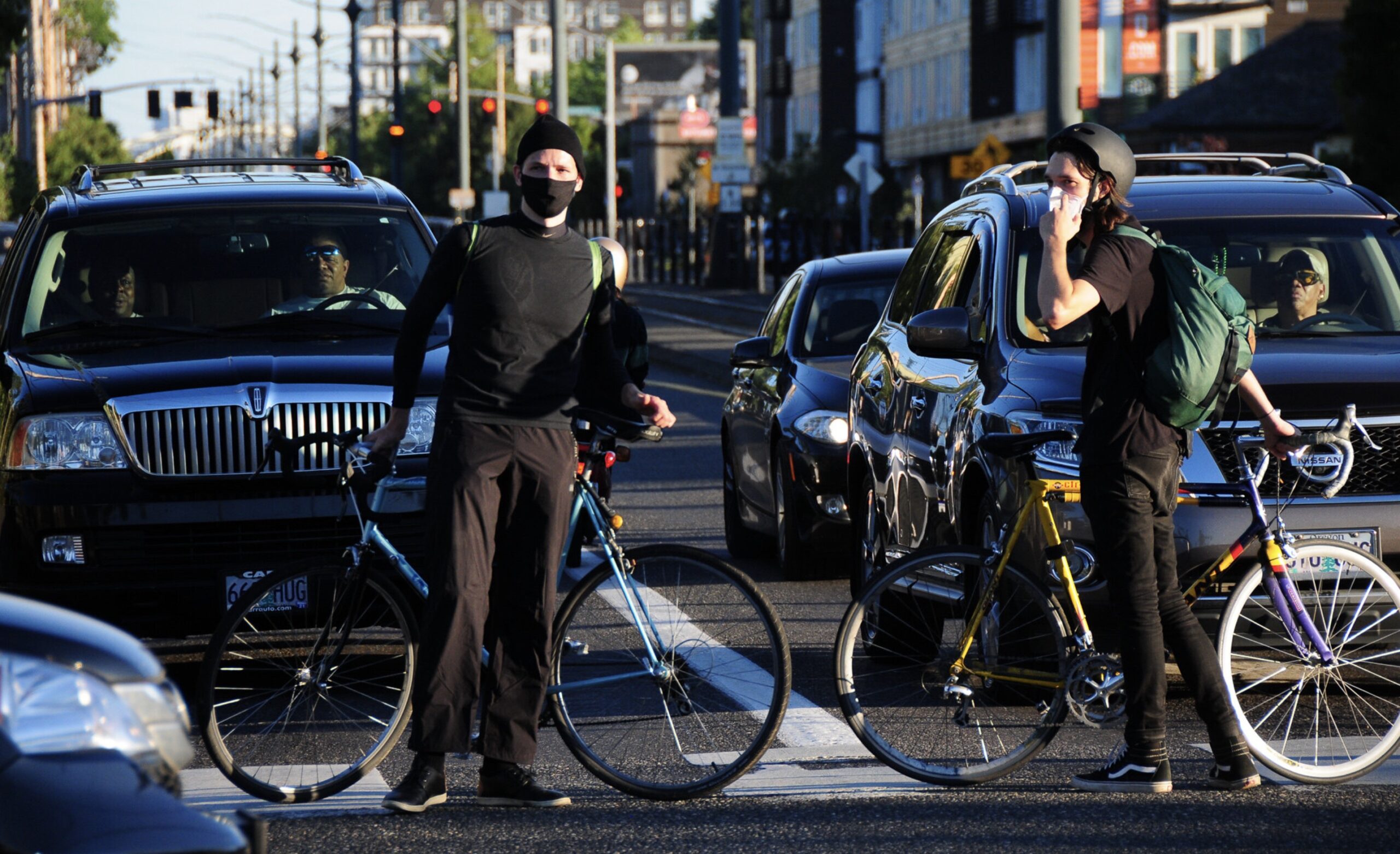
“I could see blocking a road or directing traffic or doing the other things that corkers do be interpreted as threatening to use a weapon.”
-Sarah Alvarez, CLDC
A bill in the Oregon House currently moving through the legislature has some advocates concerned that protesting while riding a bike could soon be seen as “paramilitary activity” in the eyes of the law.
HB 2572 was introduced by Representative Dacia Grayber (D-Tigard) in response to rising extremist violence in Oregon and across the country. The bill would expand the definition of ‘civil disorder’ “for purposes of crime of unlawful paramilitary activity.” It also “creates right of action for person injured by paramilitary activity and authorizes Attorney General to bring civil action for injunctive relief against paramilitary activity.”
The bill text redefines “civil disorder” to include “acts of intimidation or force by assemblages of three or more persons while armed with…dangerous weapons that obstruct, impair or hinder the administration of law or other governmental or judicial function; assert authority of purport to assert authority over one or more other persons without the consent of the persons; or prevent the exercise of constitutional rights by one or more persons.”
The bill defines “dangerous weapons” to include firearms, explosives and incendiary devices. But could the definition also include bicycles. Portland environmental lawyer Nick Caleb, who works with climate justice advocacy team Breach Collective, is concerned about that possibility.
“Because it’s unclear what so many terms in this law mean, it’s possible that someone could claim they are injured by sign, bike, or shield-wielding protestors because they were stuck in traffic and sue,” Caleb wrote on Twitter. “Because this is civil, you don’t have to prove it beyond a reasonable doubt.”
Sarah Alvarez, a staff attorney at the Eugene-based Civil Liberties Defense Center (CLDC), is also keeping an eye on this bill. She told BikePortland that she thinks since it’s possible a bike could be used to cause injury, they might be grouped in with other “dangerous weapons”.
“I’ve seen people really seriously injured by police officers using bikes as a tool for crowd control… you can definitely cause serious physical injury with a bike if you wanted to — not that a corker would want to,” Alvarez said. “I could see blocking a road or directing traffic or doing the other things that corkers do be interpreted as threatening to use a weapon.”
While bike corkers do not often injure people, especially not intentionally, their actions have been known to agitate car drivers. Since the definition of “personal injury” is loose, it’s possible that someone could claim personal injury if they were stuck in traffic behind a group of bike corkers.
Lawyers and advocates from the CLDC, Breach Collective and other environmental groups have asked legislators to rethink their support for this bill in its current state. They recognize the real threat of right-wing extremism, but want the bill to be tailored to make sure it can be used against anyone the Attorney General sees fit. But they say they’ve had a difficult time getting through to officials in Salem, and though the bill’s language has been altered slightly, they want to see more.
In a statement to BikePortland, Grayber wrote that this bill will not impact bike corking.
“To the specific concern of bike corkers, the legal experts on our team are confident that if cyclists are not using their bicycles as weapons, or using any other weapon, and are not part of a paramilitary organization, they will not come within the prohibited acts,” Grayber wrote in a statement to BikePortland. “Again, this statute could only go into effect for those acting as part of a paramilitary organization, which has its own set of parameters, and is separate from peaceful forms of protest or civil disobedience.”
But these statements haven’t done much to alleviate concerns about how the bill’s language could be interpreted. And Alvarez said that even if it’s very unlikely that a bike corker would be punished for innocently participating in a protest, the knowledge that it’s a possibility might keep people away from exercising their first amendment rights. This could even mean people eschewing the World Naked Bike Ride — technically a protest activity — for fear of retribution.
“People might say they don’t want to participate because they don’t want a civil injunction for causing personal injury. So even though it’s probably safe…it makes people anxious or unsure and basically opt out of expressing their First Amendment rights, which includes the Naked Bike Ride,” Alvarez said. “That only has to happen once for people to start being freaked out.”
HB 2572 is currently in the House Committee on Rules awaiting a hearing. Since there’s significant Republican opposition to the bill as well, it’s not guaranteed to pass. This is only one of the Oregon bills that has lawyers and advocates fearful about crackdowns on protest activity — House Bill 2772, or the “domestic terrorism bill,” is of concern for similar reasons, but doesn’t have such a direct relationship to bike riders. As these bills go through the legislature, opponents will continue to push for changes.
“We share lawmakers’ concerns about the rise of violent, right-wing extremism in Oregon. Many of us have experienced it firsthand in our advocacy in both urban and rural settings,” a letter to lawmakers from the CLDC, Breach Collective and more reads. “This said, we, and the advocates we work with, have also been subjected to government surveillance and repression while participating in constitutionally
protected protest and issue advocacy, giving us direct experience in the ways that law enforcement and criminal justice agencies selectively administer, or refuse to administer, their authority over social and political movements. As such, we urge you to reconsider the passage of
these bills in any form.”


